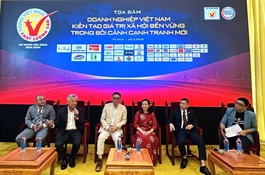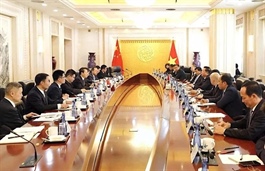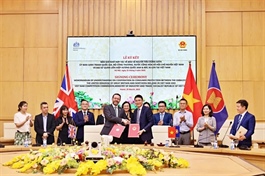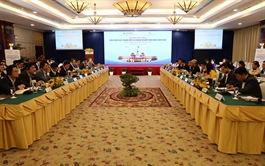Investment strategy shift in Vietnam’s education
Investment strategy shift in Vietnam’s education
Vietnam has entered into multiple bilateral and multilateral cooperation agreements on international integration in education and training with countries such as the United Kingdom, China, Brazil, and others, which have essentially created a potential investment environment in education, as evaluated by a number of foreign investors.
At the end of 2013, Vietnam set out the direction for a fundamental and comprehensive renewal of education and training in Vietnam, with one key guiding principle involving developing education and training while ensuring it meets the requirements of international integration to drive national development.

Duong Thi Mai Hoa, managing partner, Indusviet Legal |
Over the past decade, as of July 2024, the total investment capital in education had exceeded $4.57 billion with approximately 430 foreign-linked training programmes operating across 65 domestic higher education institutions. Additionally, there are now five foreign-invested higher education institutions active in Vietnam: RMIT University Vietnam, British University Vietnam, American University in Vietnam, Fulbright University Vietnam, and Tokyo Medical University Vietnam.
These figures indicate that foreign investment is primarily concentrated in higher education, largely due to advantages in policies for this segment compared to others, such as K-12 and preschool education.
In regard to Vietnam’s legal framework, aside from the aforementioned free trade deals, the country has established a relatively comprehensive legal foundation for international cooperation in education, ranging from codified laws to guiding regulations. The 2019 Law on Education has dedicated a specific section with four articles governing international cooperation in education, and upon such legal basis, guiding regulations such as October 2024’s Decree No.124/2024/ND-CP, which amends and supplements certain provisions of a previous decree regarding foreign cooperation and investment in education, have been implemented.
While some foreign-invested institutions have successfully capitalised on open policies and acquired positive results, investors still face major challenges due to the strict procedural requirements for establishing and operating a foreign-invested educational project in Vietnam.
Investors must navigate a complex investment process governed by multiple laws, involving steps such as meeting eligibility criteria for foreign investors and registering the project, registering the enterprise under corporate law, and acquiring an education operation licence.
Furthermore, additional procedures such as recognising the school principal, school board, and acquiring approval of the curriculum also further complicate the process.
Apart from procedural requirements, costs related to infrastructure, investment capital, and implementation time also pose significant challenges for investors in establishing educational institutions.
In particular, expenses, conditions, and procedures to secure a suitable location, as well as meeting infrastructure requirements, now prove to be major concerns. Under Decree 124, the minimum investment capital required to establish a branch campus of a foreign higher education institution in Vietnam is VND500 billion ($20 million), excluding land-use costs, doubling the minimum level set in the previous decree.
Also, the decree mandates that foreign higher education institutions looking to establish its campus in Vietnam must be legally established and operating in their home country and must rank among the top 500 universities in reputable rankings in at least one of the past three years.
From a policy perspective, it is clear to see that Vietnam is open to foreign investment in establishing branch campuses of foreign higher education institutions. However, along with the goal of attracting investment, the country has tightened fundamental requirements regarding infrastructure, investment capital, and institutional quality with an aim to enhance the quality and market value of Vietnam’s education sector.
As a result, in recent years, foreign investors in Vietnam’s education sector have been shifting their investment strategies. Foreign capital has increasingly flowed into mergers and acquisitions (M&A) with its key targets including language training centres – with notable transactions such as edtech startup VUIHOC’s strategic investment in the IELTS Workshop chain in June 2024. Other targets included international schools, with the significant investment deal of Nutifood acquiring Anne Hill International School in August last year, among others.
Education and M&A experts agree that with Vietnam’s strong policies encouraging investment – particularly with no restrictions on foreign ownership in educational institutions – the M&A market in Vietnam’s education sector was, is and will certainly be increasingly attractive. Especially with the inevitable rise of technology, Vietnamese edtech startups will soon be positioned as key investment targets for foreign investors looking to enter the education market.
However, foreign investors should proceed with caution. Under Vietnam’s current legal framework, M&A transactions do not yet have clearly defined regulations for the complete transfer of ownership from domestic investors to foreign ones or vice versa. This means that legal and procedural challenges may arise when transferring ownership, updating legal documents, and adjusting operational licences.
Investors may also face extended time and additional costs for processes such as renaming institutions, restructuring and recognising new school boards, or appointing foreign principals.
Amid Vietnam’s ongoing structural reforms at both central and local levels, along with a strong focus on education, investors must enhance their ability to meet regulatory conditions and ensure long-term resource stability to achieve success in Vietnam’s dynamic education market.
- 20:00 27/03/2025



























